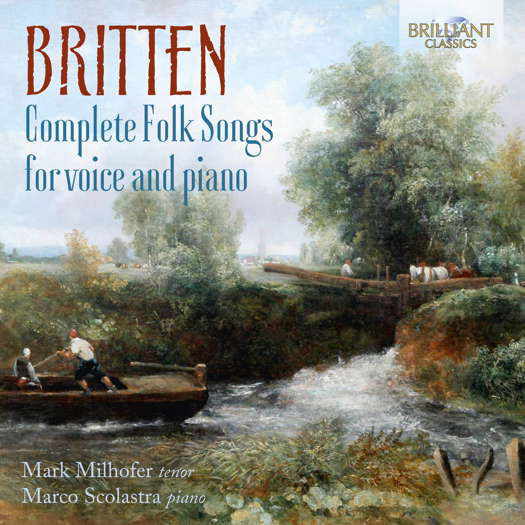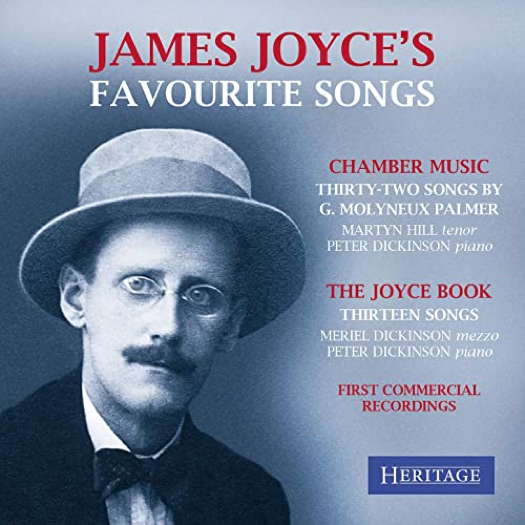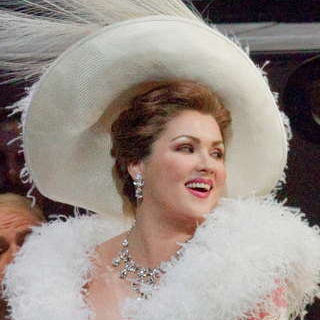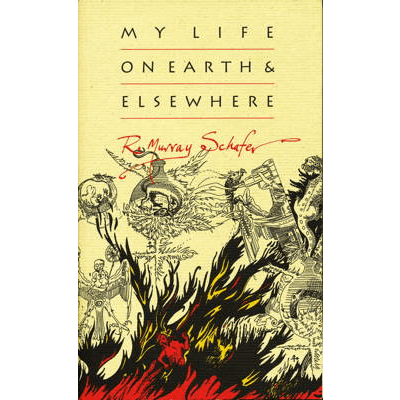
Benjamin Britten and James Joyce
GIUSEPPE PENNISI listens to two sets of English folk and other songs
'... very good listening ...'
Coincidentally, this Brilliant Classics two-CD box set of Benjamin Britten's complete folk songs is published almost simultaneously with Heritage Records' edition of a CD with James Joyce's most favourite songs. Brilliant Classics' two CD set Britten Complete Folk Songs for Voice and Piano includes all the folk songs arranged by Britten from 1943 to 1976. Instead, Heritage's CD includes the 32 songs composed by Goeffrey Molineux Palmer for Joyce between 1929 and the late 1930s; it entails also the 'Joyce Book' published by Sylvia Beach in 1927, ie thirteen songs, to Joyce's lyrics, entrusted to eight English composers, two Americans, a French, an Italian and the Irish editor of the publication, Herbert Hughes. Joyce's favourite music CD and Britten's CDs allow you to review the best production of songs in Britain throughout the twentieth century. And to appreciate their value too.
While Joyce's favourite songs are a journey from an idyllic world to the empire of the senses, Britten's songs have themes related to folklore and include joyful nursery rhyme for children too. However, they are essentially a quest to combine word and music, shaping and moulding each other. This line of research developed completely in Britten's works for the theatre, especially in his last opera, A Death in Venice. It was quite present in these songs since the oldest of them, arranged whilst in self-imposed exile in the United States during World War II. Like Joyce, Britten had the genre in the highest regard: in 1941, he wrote in the American periodical Modern Music that folksongs are concise and complete small works of art.
Britten began to take an interest in the genre and to cultivate it when he was in the United States. Folk songs reminded him of his native land (of which he had a lot of nostalgia) as well as meeting immediate financial needs: to build a repertoire with which he on the piano and Peter Pears, his companion for all their mutual earthly adventure, could do concerts in order to earn their daily bread. This passion continued after his return to his homeland. In the forty-seven songs - originally released in five books - we find folk songs from Ireland, Scotland, Somerset, Wales, Suffolk and even France. One section is a tribute to the Irish poet and musician Thomas Moore (1779–1852) of whom Britten arranged some Irish melodies.
The older songs include classics such as Oliver Cromwell and The Salley Gardens.
Listen — Benjamin Britten: The Salley Gardens
(96009 track 2, 0:13-1:07) ℗ 2021 Brilliant Classics :
The French folksongs are just lovely.
Listen — Benjamin Britten: Le roi s'en va-t'en chasse
(96009 track 15, 0:00-0:52) ℗ 2021 Brilliant Classics :
The songs from the last set are quite operatic.
In terms of artists' performance and sound performance, there are significant differences between the CD on Joyce's beloved music and the two CDs related to Britten. The first is a remastering of recorded CD performances (probably on tape) by the BBC in 1982, 1986 and 1988. The two CDs of the set on Britten were recorded in August 2019 and August 2020 at the Teatro Clitunno in Trevi, a small jewel of the late nineteenth century, restored about forty years ago, and with an excellent acoustic room. A recording, therefore, in the studio and in ideal conditions, also thanks to the excellent sound engineer, Luca Ricci.
The two interpreters are an Italian pianist, Marco Scolastra and a British tenor who often works in Italy, Mark Milhofer. They offer a philological edition also and above all because Milhofer's vocality is the closest to that of Peter Pears: a robust centre register, elegant phrasing and a soft legato. In two of the songs, Lorna Windsor's beautiful soprano voice appears. The two CDs offer an integral repertoire that allows us to analyze all facets of a complex composer like Britten.

This Heritage CD reproduces two different sets of piano and vocal songs originally recorded by the BBC in 1982, 1986 and 1988 and now no longer available. The common thread is that they are considered to be the music most appreciated by the Irish writer James Joyce.
The first set encompasses thirty-two short songs for tenor and piano composed by Geoffrey Molyneux Palmer (1882-1957). Palmer was born of Irish parents in Staines, Middlesex (England). He studied at Oxford where, in 1901, he was the youngest Bachelor of Music in history. Between 1904 and 1907, he studied composition at the Royal College of Music in London. He moved to Ireland in 1910 where he was initially active as a church organist in the Dublin suburbs. Almost all of his published and other major compositions date from his time in Ireland. From his early twenties, he suffered from multiple sclerosis, which made professional independence increasingly difficult. In the last decades of his life, Palmer was confined to a wheelchair. He depended upon the care of his two sisters, who were running Hillcourt, a private girls' boarding school in Glenageary, near their home in Sandycove (south Dublin). Palmer died in Dublin. Very few musicians and music experts remember him.
Palmer's music includes at least three operas, a number of choral pieces and many songs. His strong interest in opera came during a politically difficult period in Irish history. Ireland was struggling for independence; politicians often regarded opera (and classical music in general) as alien to Irish culture. Initially, however, he was successful, but there are no record of performances of these operas in the last seventy years. He was mainly known as the composer of light songs and ballads, often in a folkloristic style, that found publishers in England and were frequently performed. His choral music is mainly on a similar miniature scale, an exception being the early cantata The Abbot of Innisfallen (1909). There are some isolated examples of orchestral music performed by the orchestra of Radio Éireann.
Joyce and Palmer were good friends since their youth. Often Joyce said that of the many settings of his poetry, Palmer's were the finest. As the booklet in the CD explains, Joyce tried to arrange the songs for publication on several occasions but he was hardly successful. The manuscript had a complicated history: it was lost, found, then lost again. Eventually, in 1993 the American researcher Myra Teicher Russel published them in the book James Joyce's Chamber Music: the Lost Settings with Indiana University Press. In addition, a cassette of the songs was made with Robert White and Samuel Sanders. Nowadays, the book is a rare bird to find and the cassette impossible to locate.
The thirty-two songs are very short: only one of them has a duration of more than two minutes, and most last less than a minute. There is a theme in the collection as presented on this CD: a journey from innocence to disillusion. Innocence and description of a gentle landscape are the theme of the first group of songs.
Listen — Geoffrey Molyneux Palmer: The twilight turns from amethyst
(HTGCD 175 track 2, 0:00-0:30) ℗ 2020 BBC :
A second set is about courtship.
The final group, which are very sensual, in pure Joyce manner, are very interesting.
Listen — Geoffrey Molyneux Palmer: Sleep now
(HTGCD 175 track 30, 0:00-0:33) ℗ 2020 BBC :
Martyn Hill is a good effective tenor with excellent phrasing, quite experienced in contemporary music. He is the right person for this kind of song.
The second set was published by Sylvia Beach at her bookshop in Paris - Shakespeare & Co - in 1927. She had made history in 1922 because she purchased the rights and published Ulysses which was banned in the United States until 1934 and in Great Britain until 1936. The set, titled The Joyce Book, is made of thirteen songs, each entrusted to a different composer – eight Englishmen, two Americans, two Frenchmen, an Italian and the Irish editor of the book, Herbert Hughes. Here the songs are clearly inspired by Joyce's writing. They are for mezzo and piano.
Subjects range from Irish landscape as in tracks 33 and 35 to memories and players as in tracks 43 and 45.
Listen — Bernard van Dieren: A Prayer
(HTGCD 175 track 45, 2:13-3:06) ℗ 2020 BBC :
The mezzo is Meriel Dickinson who has worked with Britten, Copland, Boulez and Berio, and is a specialist of twentieth century repertory.
A very fine pianist, Peter Dickinson, accompanies both of them.
In short, very good listening, recalling a great writer.
Copyright © 7 March 2021
Giuseppe Pennisi,
Rome, Italy

CD INFORMATION - BRITTEN: COMPLETE FOLK SONGS FOR VOICE AND PIANO
CD INFORMATION: JAMES JOYCE'S FAVOURITE SONGS




